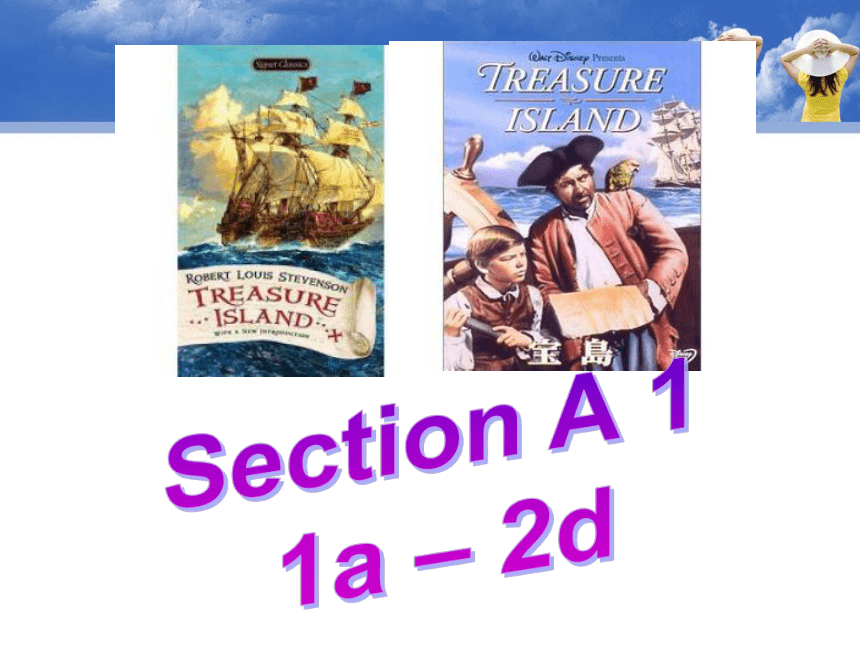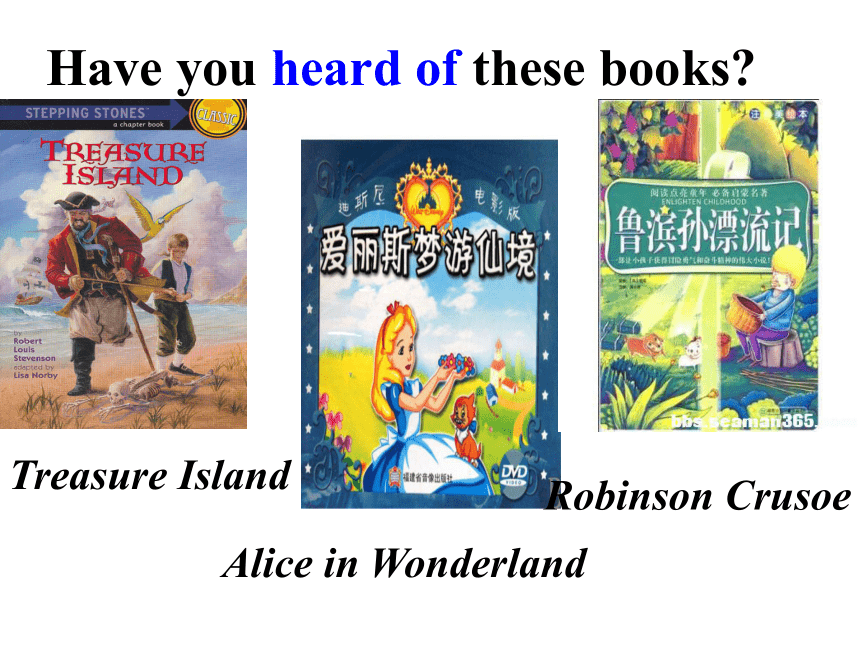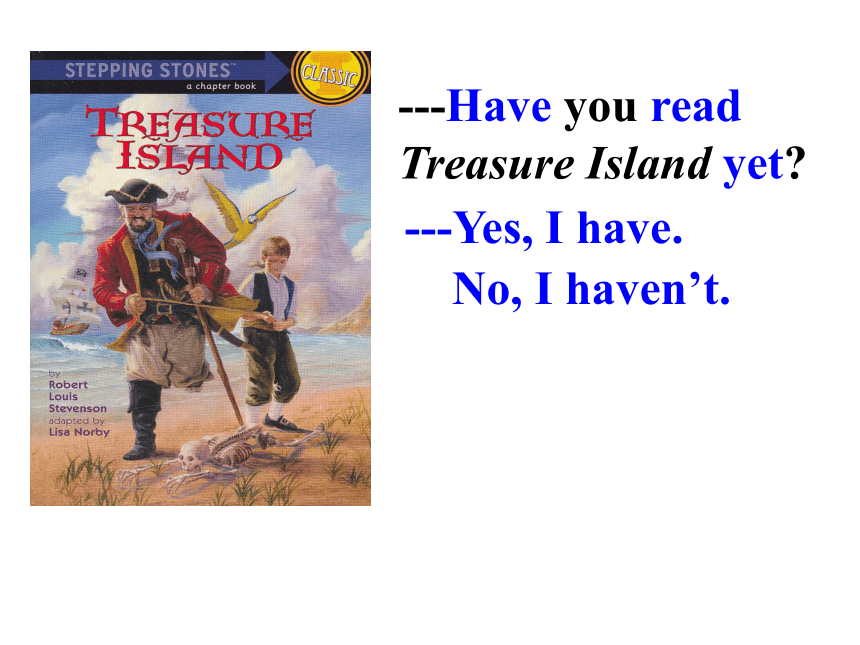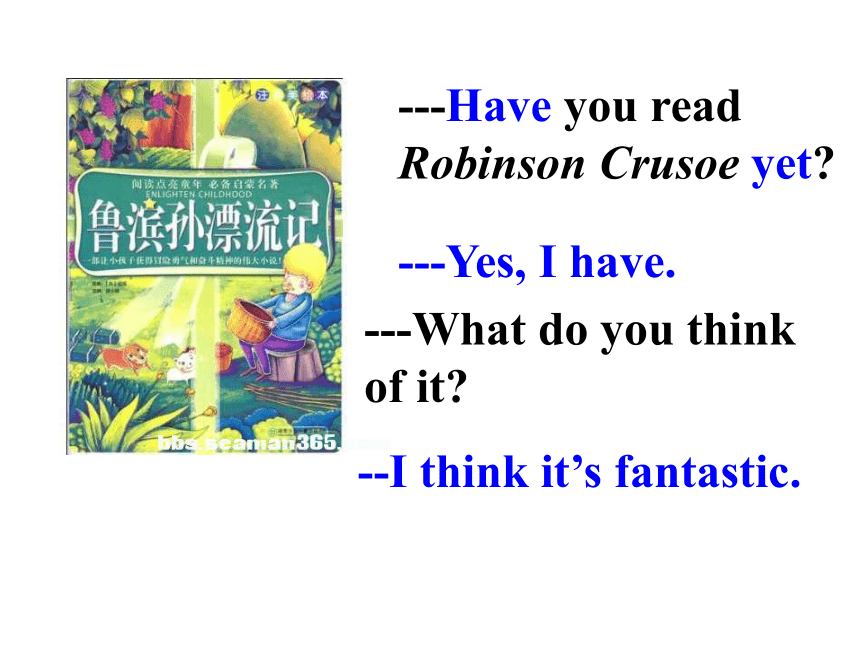Unit 8 Have you read Treasure Island yet? Section A3课时课件
文档属性
| 名称 | Unit 8 Have you read Treasure Island yet? Section A3课时课件 |  | |
| 格式 | zip | ||
| 文件大小 | 3.7MB | ||
| 资源类型 | 教案 | ||
| 版本资源 | 人教新目标(Go for it)版 | ||
| 科目 | 英语 | ||
| 更新时间 | 2014-08-21 12:39:13 | ||
图片预览












文档简介
课件67张PPT。Unit 8
Have you read Treasure Island yet?
Section A 1
1a – 2d Have you heard of these books?Treasure IslandAlice in WonderlandRobinson CrusoeLittle WomenTom SawyerOliver Twist---Have you read
Treasure Island yet?---Yes, I have.
No, I haven’t.---Have you read
Alice in Wonderland
yet?---Yes, I have.
No, I haven’t.---Have you read
Robinson Crusoe yet?---Yes, I have.
--I think it’s fantastic.---What do you think of it?---Have you read
Tom Sawyer yet?---Yes, I have.---What do you think of it?--I think it’s fantastic.1a Have you read these books? Check (√) the ones you know.
___ Alice in Wonderland ___ Little Women
___ Treasure Island ___ Olive Twist
___ Robinson Crusoe ___ Tom Sawyertreasure n. 珠宝,财富(不可数名词);
珍藏品(可数名词)
e.g. They went to there to look for
treasure. 他们去那儿寻宝。
This museum has many art treasures.
这家博物馆收藏了许多艺术珍品。
an island 一个岛屿Listening×√√×√×excitingwonderfulfantastic1b Listen and complete the chart.Treasure IslandRobinson CrusoeLittle womenA: Have you read Little Women yet?
B: No, I haven’t. Have you?
A: Yes, I have already read it.
B: What’s it like?
A: It’s fantastic.1c Practice the conversation. Then
talk about the other books in 1a.Speaking1. Treasure Island Mark / Tina
2. Olive Twist Mark / Tina
3. Robinson Crusoe Mark / Tina
4. Tom Sawyer Mark / Tina 2a Listen. Who has read these books? Circle the names.Listening1. Oliver Twist is about a boy who goes out to sea and finds an island full of treasures. ( )
2. Robinson Crusoe is a classic. ( )
3. Tina thinks that Treasure Island is a fantastic book. ( )
4. Tom Sawyer is about a boy who lives in the United Kingdom. ( )2b Listen again and write T for true and F for false.FFTTclassic n. 名著;经典著作(可数名词)
e.g. I like reading classics. 我喜欢阅读名著。
classical古典的
be full of 满是……的;(有)大量的,充满……
e.g. The area is full of beautiful lakes and rivers.
这个区域有大量美丽的湖泊和河流。
A: Has Tina read Treasure Island?
B: Yes, she has. She thinks it’s fantastic.
A: What’s it about?
B: It’s about a boy who goes out to sea and
finds an island full of treasures.
A: What are you reading now?
B: I’ve just finished Robinson Crusoe.
A: …2c. Use the information in 2a and 2b to talk about the books.2d Role-play conversation.Amy: Steve, have you decided yet which book
to write about for English class?
Steve: Yes, Little Women. I’ve already finished
reading it!
Amy: Wow, you’re fast! What’s it about?
Steve: It’s about four sisters growing up. It was
really good, so I couldn’t put it down.
Which book did you choose?2d. Role-play the conversation.Amy: I chose Treasure Island, but I haven’t
finished reading it yet. I’m only on page 25.
Steve: Have you at least read the back of the
book to see what it’s about?
Amy: Yes, I have. It looks interesting.
Steve: You should hurry up. The book report is
due in two weeks.
Amy: Yes, I know. I’ll read quicklypage n. 页(可数名词) e.g. five pages 5页
on page 5 在第五页上
hurry up 赶快;
(急忙)做某事
e.g. Hurry up, or we
cannot get to the
station on time. 快些,否则我们不能按
时赶到车站了。
hurry v. 匆忙,赶快
常见词组归纳:
in a hurry (n.) 匆忙地
hurry to do sth. 匆忙地做某事;
hurry to+地点 匆忙地赶到某地;
hurry up 快点 赶快
Section A 2
3a – 3c 复习:用in/ after/later填空。 1.He will be back______ two hours. 2.He came back _______two hours. =He came back two hours_______
3.He will be back ________two o'clock.in + 一段时间 将来时 after +一段时间=一段时间+later 过去时 after+时间点 过去将来都行inafterlateraftership n. 船(可数名词)— ships;
by ship 乘船
tool n. 工具(可数名词)— tools;
with tools 用工具
gun n. 枪(可数名词)— guns;
with a gun 带着/用枪
sand n. 沙滩,沙(不可数名词)New wordscannibal n. 食人肉者(可数名词)
— cannibals
towards prep. 朝,向,对着
walk/ run towards →walk/ run to
land n. 陆地,大地(不可数名词)
on land 在陆地上Robinson Crusoe 《鲁滨逊漂流记》由英国作家丹尼尔·笛福所著。它是一部家喻户晓的现实主义回忆录式冒险小说。作者受一个苏格兰水手海上遇险的经历启发写成的。
它是长篇小说,作于1719年。主人公鲁滨孙因乘船遭遇风暴失事,漂流到孤岛,独自在那里生活了二十多年,历尽艰难困苦,不但供给了自己日用所需,而且经营了一片肥美的土地。鲁滨孙是他那个时代的创业者。作者借此歌颂了处在上升时期的资产阶级个人奋斗精神。
小说情节生动,细节逼真,描写细致,语言流畅,富于深
刻的哲学和社会意义。作者继此又写了第二部和第三部。
第二部写鲁滨孙旧地重游,以岛的主人自居,开化岛上
居民,接着又到世界各地冒险,包括中国和西伯利亚。
第三部大多是道德说教。鲁滨孙还是一个有爱心的人他救了一个野人名叫星期五,
因为是在星期五救他的所以叫星期五,还救了一个船长。
《 鲁宾孙漂流记》使我们明白:当一个人的生活处境走
投无路时,不应该对生活失去信心,而应该像鲁宾孙一
样对生活积极,充满信心,勇敢面对困难,面对现实,更
重要的是要学会创造生活。山重水复疑无路,柳暗花明又
一村。Read the passage based on Robinson Crusoe and answer the following questions.1. What does Robinson Crusoe wait for?
2. Why does Robinson Crusoe call the man Friday?3acall /name sb./sth.+名字 “把某人/某物叫做……/
给某人/物取名为……”。
”Please call /name the girl Lily.注意和:sb./sth. called/named +名字
“名叫 ……的某人/某物 ”的区别He’s a boy called/named Jim.如:他是一个名叫吉姆的男孩。“以……为依据”阅读指导Skimming (略读法):跳跃式阅读,注重开头、结尾、关键词、主题句。
Guessing (猜读法):联系上下文,利用构词法,猜猜词义。
Realizing (悟读法):通过关键词、句、段的理解,了解作者意图,文章主旨。1. 先认真阅读每个题目的意思,弄清要求我们寻找什么信息。
2. 带着问题,再来读短文。在短文中认真寻找我们所需的信息,在有相关内容的地方,应多读几次认真理解,以找到想要找的信息。
3. 最后,再通读一遍,检查一下所找的答案是否正确。阅读理解解题指导Read the passage and answer the following questions.1. What does Robinson Crusoe wait for?
2. Why does Robinson Crusoe call the man Friday?ReadingAnother ship.Because that was the day he met the man.3aNow let’s read the story carefully.although“虽然,尽管”,引导让步状语从句,
不能与but连用。
e.g. He is young, but he works hard.
他年龄小,但是工作很努力到达并登上这个岛 run towards → run to
朝……跑teach sb. sth.”教某人…..“teach sb. how to do sth.”教某人怎样做某事”name作动词,意为“命名;给……取名”。teach oneself…自学……Read the passage again. Find words that have these meanings.1. You can use these to shoot things: _____
2. Something you use to travel in the sea: _____
3. A piece of land in the middle of the sea: ______
4. You can use these to cut things: ______
5. Signs left behind by someone or something: ______gunsshipislandknivesmarks3b留下,遗留3cCorrect(纠正/改正) the sentences.1. Robinson Crusoe arrived on the island with enough food and drink.
2. Friday made a small boat.
3. Robinson had some food and tools when he first arrived on the island. nothing.Robinson Crusoe made a small boat.Robinson had nothing when he first arrived on the island. 4. Robinson used the ship to build a house.
5. Friday saw some marks of another man’s feet on the beach.
6. Robinson tried to kill the two men.cut down trees to build a house.Robinson Crusoe saw some marks of another man’s feet on the beach.Some cannibals tried to kill the two men.arrive on this island
make a boat
bring back
give up doing sth.
wait for sb./sth.
cut down
build a house1.到达这个岛上
2.制作一艘船
3.带回来
4.放弃做某事
5.等候某人/某物
6.砍倒
7.建房子kill … for food
the marks of
another man’s feet
who else
see sb. doing sth.
run towards…
help sb. do sth.
name/call sb. …
teach sb. sth.8.杀死……作为食物
9.另一个人的脚印
10.还有谁
11.看见某人正在做某事
12.朝……跑
13.帮助某人做某事
14.给某人起名为……
15.教某人某事一 翻译下列句子:我已经读完它了。
这本书非常棒,我对它爱不释手。
读书报告两周后必须交。
鲁滨逊漂流记是本经典之作。I have already finished reading it.This book is really good, so I couldn’t put it down.The book report is due in two weeks. Robinson Crusoe is a classic .Section A 3
Grammar focus-4cRead the following sentences we have seen.Have you read Little Women yet?
Yes, I have./ No, I haven't.
Has Tina read Treasure Island yet?
Yes, she has. She thinks it’s fantastic.
Have you decided which book to write about yet?
Yes, I have. I’ve already finished reading it.
It was really good.
Grammar focus一.用法
1. 表示过去发生或已经完成的某一动作
对现在造成的影响或结果(简称:完成用法)。
e.g. –Have you had your lunch yet?
–Yes, I have. I’ve just had it. (现在
我不饿了。)现在完成时时间状语:
already, yet, just, ever, never, before
二 .构成:
1. 肯定句:主语 + have / has + 过去分词 (+ 其他)
2. 否定句:主语 + have / has + not + 过去 分词
(+ 其他)
3. 一般疑问句:Have/ Has + 主语 + 过去 分词
(+ 其他)
4. 特殊疑问句:
1)特殊疑问词 (不是句子主语) + have / has
+ 主语+过去分词 (+ 其他)
2) 特殊疑问词(是句子主语)+have / has+
过去分词(+ 其他)
规则动词的过去分词构成与过去式相同,不规则动词的过
去分词则需逐个记忆。 Exercises 4a Use the words in brackets to
complete the conversations.
1. A: Would you like something to drink?
B: No, thanks. _______________________.
(just/ drink some tea)
2. A: I heard you lost your key.
____________________? (find)
B: No, not yet.I have just drunk some teaHave you found it3. A: Do you know when Tom is leaving?
B: ________________________.
(already/ leave)
A: When ___________________? (leave)
B: This morning.
4. A: Is your sister going to the movies
with us tonight?
B: No. __________________________.
(already/ see the film)He has already leftdid he leaveShe has already seen the film5. A: What do your parents think about
our plan?
B: I __________________. (not/ tell
them/yet)haven’t told them yet4b Fill in the blanks with the correct
forms of the words in the brackets.
Sally ____ (love) reading. In the morning she reads the newspaper and in the evening she reads books. She ___ already ____ (read) more than 100 different books. Her favorite kind of books is science fiction. She is interested in science and technology and loves to imagine what the world ______ (be) like in 50 years. loveshasreadwill be She _______ (finish) reading a book about robots last week and _________ (write) a book report about it next week for her French class. Every time she is in the library, Sally looks at the many books she __________ (not read) yet and she can’t wait to read them.finishedwill writehasn’t read迫不及待地做某事许多学生在星期五迫不及待地回家。Many students can’t wait to go home on Friday.Groupwork 4c Complete the chart with information about
you and your friend.A: What books have you already read?
B: I have already read Tom Sawyer and
Harry Potter.
A: What do you think of them?
B: Well, I think Harry Potter was exciting,
but Tom Sawyer was a bit boring.( )【2013广西贵港】
—Do you know the movie Lost in
Thailand?
—Yes. I ______ it twice. It’s funny.
A. saw B. see C. have seen D. will see C中考链接( )【2013黑龙江牡丹江】
—Lunch?
—No, thanks. I__________.
A. will eat B. am eating C. have eaten
( )【2013 湖北黄冈】
—Where is Tom? We can’t find
him anywhere.
— Perhaps he _____ home.
A. has come B. is going
C. went D. was goingCA 1. Although I have lost everything, I have not lost my life.
虽然我失去了一切,但是没有失去生命。
although“虽然,尽管”,引导让步状语从句,不能与but连用。
e.g. He is young, but he works hard.
他年龄小,但是工作很努力。Language points 2. So I will not give up and I will wait for another ship.
因此我不放弃,要等候另一只船。
another 既可用作形容词,也可用作代词。用作形容词时,意思是“又一的;再一的”,修饰名词,位于名词前;用作代词时,意思是“另一个”。
e.g. Just at that time, another man came in.
Saying is one thing and doing is another. another还可以和数词连用,常放在数词的前面,意为“还;再;又”。
e.g. We need another three man to
help do the work.3. How long have they been here?
你来这儿多久了?
how long 常用于询问时间,意为“多久;多长时间”,与现在完成时连用,要求谓语动词必须是延续性动词。
e.g. How long have you had the book?
你买这本书多久了?5. One of them died, but the other ran towards my house.
他们当中一个人死了,但是另一个朝我的房子跑来。
run towards 朝……跑
e.g. He ran towards the station.
他跑着去火车站。6. I named him Friday because that was the day I met him.
我管他叫Friday因为那是我遇见他的那一天。
name作动词,意为“命名;给……取名”。固定搭配“name + sb. + 名字”意为“给某人取名为……”。
e.g. Lucy named her little son David.
露西给她的小儿子取名为戴维。6. due adj. 预定的, 到期的
e.g. The plane is due at London at five.
飞机定于五点到达伦敦。
I am due to speak tomorrow.
我预定明天讲话。
短语:due to 由于
e.g. a mistake due to carelessness
由于粗心而犯的错误4. Steve: …The book report is due in two
weeks.
Amy: Yes, I know… 是的,我知道…1) due adj. 预定;预期;预计
后边引出预期的时间、地点等,还常 常构成短语be due (to do something)或be due (for something)。e.g. Our plane is due at Shanghai Hongqiao International Airport at 12:30.
我们的飞机预计于12:30降落在上海虹桥国际机场。
Rose is due to start school in January.
罗丝一月份就要开始上学了。
You are due for a medical examination next month.
你的身体检查预定在下个月。2) I know表示说话人对所谈的观点、内容已了解,无需多说,相当于汉语中“我早知道了;我全都了解”这样的意思,区别于许多日常交际场合中表示“我明白了;我知道了;我懂了”的用法。e.g. A: It’s already very late. You should get some rest.
已经很晚了,你应该休息了。
B: Well, I know. Thanks.
对,我是知道的。谢谢。注意,当我们获知对方提供的信息后,常用I see. 表示“我知道了;我明白了;我懂了”。
e.g. A: He lives in the countryside but
works in the city during the week.
他住在乡下,但工作日在城里上班。
B: Oh, I see.
哦,我知道了。Phrases:
hear of 听说
be like 像……一样
go out 出去
full of 充满
finish doing sth. 做完某事
be about 关于
grow up 长大
put +代词+ down 把……放下
hurry up 快点SummarySentences:
1. Have you ever read Little Women yet?
你曾经看过小妇人吗?
2. What’s it like? What’s it about?
它是关于什么的?3. Oliver Twist is about a boy who goes out to sea and finds an island full of treasures.《雾都孤儿》是一个男孩去海边发现一个充满珍宝的岛的故事。
4. Steve, have you decided yet which book to write about for English class?
史蒂文,你决定为英语课写哪本书了吗?
5. The book report is due in two weeks.
读书报告两周后必须完成。HomeworkLearn the new words and expressions by heart.
Have you read Treasure Island yet?
Section A 1
1a – 2d Have you heard of these books?Treasure IslandAlice in WonderlandRobinson CrusoeLittle WomenTom SawyerOliver Twist---Have you read
Treasure Island yet?---Yes, I have.
No, I haven’t.---Have you read
Alice in Wonderland
yet?---Yes, I have.
No, I haven’t.---Have you read
Robinson Crusoe yet?---Yes, I have.
--I think it’s fantastic.---What do you think of it?---Have you read
Tom Sawyer yet?---Yes, I have.---What do you think of it?--I think it’s fantastic.1a Have you read these books? Check (√) the ones you know.
___ Alice in Wonderland ___ Little Women
___ Treasure Island ___ Olive Twist
___ Robinson Crusoe ___ Tom Sawyertreasure n. 珠宝,财富(不可数名词);
珍藏品(可数名词)
e.g. They went to there to look for
treasure. 他们去那儿寻宝。
This museum has many art treasures.
这家博物馆收藏了许多艺术珍品。
an island 一个岛屿Listening×√√×√×excitingwonderfulfantastic1b Listen and complete the chart.Treasure IslandRobinson CrusoeLittle womenA: Have you read Little Women yet?
B: No, I haven’t. Have you?
A: Yes, I have already read it.
B: What’s it like?
A: It’s fantastic.1c Practice the conversation. Then
talk about the other books in 1a.Speaking1. Treasure Island Mark / Tina
2. Olive Twist Mark / Tina
3. Robinson Crusoe Mark / Tina
4. Tom Sawyer Mark / Tina 2a Listen. Who has read these books? Circle the names.Listening1. Oliver Twist is about a boy who goes out to sea and finds an island full of treasures. ( )
2. Robinson Crusoe is a classic. ( )
3. Tina thinks that Treasure Island is a fantastic book. ( )
4. Tom Sawyer is about a boy who lives in the United Kingdom. ( )2b Listen again and write T for true and F for false.FFTTclassic n. 名著;经典著作(可数名词)
e.g. I like reading classics. 我喜欢阅读名著。
classical古典的
be full of 满是……的;(有)大量的,充满……
e.g. The area is full of beautiful lakes and rivers.
这个区域有大量美丽的湖泊和河流。
A: Has Tina read Treasure Island?
B: Yes, she has. She thinks it’s fantastic.
A: What’s it about?
B: It’s about a boy who goes out to sea and
finds an island full of treasures.
A: What are you reading now?
B: I’ve just finished Robinson Crusoe.
A: …2c. Use the information in 2a and 2b to talk about the books.2d Role-play conversation.Amy: Steve, have you decided yet which book
to write about for English class?
Steve: Yes, Little Women. I’ve already finished
reading it!
Amy: Wow, you’re fast! What’s it about?
Steve: It’s about four sisters growing up. It was
really good, so I couldn’t put it down.
Which book did you choose?2d. Role-play the conversation.Amy: I chose Treasure Island, but I haven’t
finished reading it yet. I’m only on page 25.
Steve: Have you at least read the back of the
book to see what it’s about?
Amy: Yes, I have. It looks interesting.
Steve: You should hurry up. The book report is
due in two weeks.
Amy: Yes, I know. I’ll read quicklypage n. 页(可数名词) e.g. five pages 5页
on page 5 在第五页上
hurry up 赶快;
(急忙)做某事
e.g. Hurry up, or we
cannot get to the
station on time. 快些,否则我们不能按
时赶到车站了。
hurry v. 匆忙,赶快
常见词组归纳:
in a hurry (n.) 匆忙地
hurry to do sth. 匆忙地做某事;
hurry to+地点 匆忙地赶到某地;
hurry up 快点 赶快
Section A 2
3a – 3c 复习:用in/ after/later填空。 1.He will be back______ two hours. 2.He came back _______two hours. =He came back two hours_______
3.He will be back ________two o'clock.in + 一段时间 将来时 after +一段时间=一段时间+later 过去时 after+时间点 过去将来都行inafterlateraftership n. 船(可数名词)— ships;
by ship 乘船
tool n. 工具(可数名词)— tools;
with tools 用工具
gun n. 枪(可数名词)— guns;
with a gun 带着/用枪
sand n. 沙滩,沙(不可数名词)New wordscannibal n. 食人肉者(可数名词)
— cannibals
towards prep. 朝,向,对着
walk/ run towards →walk/ run to
land n. 陆地,大地(不可数名词)
on land 在陆地上Robinson Crusoe 《鲁滨逊漂流记》由英国作家丹尼尔·笛福所著。它是一部家喻户晓的现实主义回忆录式冒险小说。作者受一个苏格兰水手海上遇险的经历启发写成的。
它是长篇小说,作于1719年。主人公鲁滨孙因乘船遭遇风暴失事,漂流到孤岛,独自在那里生活了二十多年,历尽艰难困苦,不但供给了自己日用所需,而且经营了一片肥美的土地。鲁滨孙是他那个时代的创业者。作者借此歌颂了处在上升时期的资产阶级个人奋斗精神。
小说情节生动,细节逼真,描写细致,语言流畅,富于深
刻的哲学和社会意义。作者继此又写了第二部和第三部。
第二部写鲁滨孙旧地重游,以岛的主人自居,开化岛上
居民,接着又到世界各地冒险,包括中国和西伯利亚。
第三部大多是道德说教。鲁滨孙还是一个有爱心的人他救了一个野人名叫星期五,
因为是在星期五救他的所以叫星期五,还救了一个船长。
《 鲁宾孙漂流记》使我们明白:当一个人的生活处境走
投无路时,不应该对生活失去信心,而应该像鲁宾孙一
样对生活积极,充满信心,勇敢面对困难,面对现实,更
重要的是要学会创造生活。山重水复疑无路,柳暗花明又
一村。Read the passage based on Robinson Crusoe and answer the following questions.1. What does Robinson Crusoe wait for?
2. Why does Robinson Crusoe call the man Friday?3acall /name sb./sth.+名字 “把某人/某物叫做……/
给某人/物取名为……”。
”Please call /name the girl Lily.注意和:sb./sth. called/named +名字
“名叫 ……的某人/某物 ”的区别He’s a boy called/named Jim.如:他是一个名叫吉姆的男孩。“以……为依据”阅读指导Skimming (略读法):跳跃式阅读,注重开头、结尾、关键词、主题句。
Guessing (猜读法):联系上下文,利用构词法,猜猜词义。
Realizing (悟读法):通过关键词、句、段的理解,了解作者意图,文章主旨。1. 先认真阅读每个题目的意思,弄清要求我们寻找什么信息。
2. 带着问题,再来读短文。在短文中认真寻找我们所需的信息,在有相关内容的地方,应多读几次认真理解,以找到想要找的信息。
3. 最后,再通读一遍,检查一下所找的答案是否正确。阅读理解解题指导Read the passage and answer the following questions.1. What does Robinson Crusoe wait for?
2. Why does Robinson Crusoe call the man Friday?ReadingAnother ship.Because that was the day he met the man.3aNow let’s read the story carefully.although“虽然,尽管”,引导让步状语从句,
不能与but连用。
e.g. He is young, but he works hard.
他年龄小,但是工作很努力到达并登上这个岛 run towards → run to
朝……跑teach sb. sth.”教某人…..“teach sb. how to do sth.”教某人怎样做某事”name作动词,意为“命名;给……取名”。teach oneself…自学……Read the passage again. Find words that have these meanings.1. You can use these to shoot things: _____
2. Something you use to travel in the sea: _____
3. A piece of land in the middle of the sea: ______
4. You can use these to cut things: ______
5. Signs left behind by someone or something: ______gunsshipislandknivesmarks3b留下,遗留3cCorrect(纠正/改正) the sentences.1. Robinson Crusoe arrived on the island with enough food and drink.
2. Friday made a small boat.
3. Robinson had some food and tools when he first arrived on the island. nothing.Robinson Crusoe made a small boat.Robinson had nothing when he first arrived on the island. 4. Robinson used the ship to build a house.
5. Friday saw some marks of another man’s feet on the beach.
6. Robinson tried to kill the two men.cut down trees to build a house.Robinson Crusoe saw some marks of another man’s feet on the beach.Some cannibals tried to kill the two men.arrive on this island
make a boat
bring back
give up doing sth.
wait for sb./sth.
cut down
build a house1.到达这个岛上
2.制作一艘船
3.带回来
4.放弃做某事
5.等候某人/某物
6.砍倒
7.建房子kill … for food
the marks of
another man’s feet
who else
see sb. doing sth.
run towards…
help sb. do sth.
name/call sb. …
teach sb. sth.8.杀死……作为食物
9.另一个人的脚印
10.还有谁
11.看见某人正在做某事
12.朝……跑
13.帮助某人做某事
14.给某人起名为……
15.教某人某事一 翻译下列句子:我已经读完它了。
这本书非常棒,我对它爱不释手。
读书报告两周后必须交。
鲁滨逊漂流记是本经典之作。I have already finished reading it.This book is really good, so I couldn’t put it down.The book report is due in two weeks. Robinson Crusoe is a classic .Section A 3
Grammar focus-4cRead the following sentences we have seen.Have you read Little Women yet?
Yes, I have./ No, I haven't.
Has Tina read Treasure Island yet?
Yes, she has. She thinks it’s fantastic.
Have you decided which book to write about yet?
Yes, I have. I’ve already finished reading it.
It was really good.
Grammar focus一.用法
1. 表示过去发生或已经完成的某一动作
对现在造成的影响或结果(简称:完成用法)。
e.g. –Have you had your lunch yet?
–Yes, I have. I’ve just had it. (现在
我不饿了。)现在完成时时间状语:
already, yet, just, ever, never, before
二 .构成:
1. 肯定句:主语 + have / has + 过去分词 (+ 其他)
2. 否定句:主语 + have / has + not + 过去 分词
(+ 其他)
3. 一般疑问句:Have/ Has + 主语 + 过去 分词
(+ 其他)
4. 特殊疑问句:
1)特殊疑问词 (不是句子主语) + have / has
+ 主语+过去分词 (+ 其他)
2) 特殊疑问词(是句子主语)+have / has+
过去分词(+ 其他)
规则动词的过去分词构成与过去式相同,不规则动词的过
去分词则需逐个记忆。 Exercises 4a Use the words in brackets to
complete the conversations.
1. A: Would you like something to drink?
B: No, thanks. _______________________.
(just/ drink some tea)
2. A: I heard you lost your key.
____________________? (find)
B: No, not yet.I have just drunk some teaHave you found it3. A: Do you know when Tom is leaving?
B: ________________________.
(already/ leave)
A: When ___________________? (leave)
B: This morning.
4. A: Is your sister going to the movies
with us tonight?
B: No. __________________________.
(already/ see the film)He has already leftdid he leaveShe has already seen the film5. A: What do your parents think about
our plan?
B: I __________________. (not/ tell
them/yet)haven’t told them yet4b Fill in the blanks with the correct
forms of the words in the brackets.
Sally ____ (love) reading. In the morning she reads the newspaper and in the evening she reads books. She ___ already ____ (read) more than 100 different books. Her favorite kind of books is science fiction. She is interested in science and technology and loves to imagine what the world ______ (be) like in 50 years. loveshasreadwill be She _______ (finish) reading a book about robots last week and _________ (write) a book report about it next week for her French class. Every time she is in the library, Sally looks at the many books she __________ (not read) yet and she can’t wait to read them.finishedwill writehasn’t read迫不及待地做某事许多学生在星期五迫不及待地回家。Many students can’t wait to go home on Friday.Groupwork 4c Complete the chart with information about
you and your friend.A: What books have you already read?
B: I have already read Tom Sawyer and
Harry Potter.
A: What do you think of them?
B: Well, I think Harry Potter was exciting,
but Tom Sawyer was a bit boring.( )【2013广西贵港】
—Do you know the movie Lost in
Thailand?
—Yes. I ______ it twice. It’s funny.
A. saw B. see C. have seen D. will see C中考链接( )【2013黑龙江牡丹江】
—Lunch?
—No, thanks. I__________.
A. will eat B. am eating C. have eaten
( )【2013 湖北黄冈】
—Where is Tom? We can’t find
him anywhere.
— Perhaps he _____ home.
A. has come B. is going
C. went D. was goingCA 1. Although I have lost everything, I have not lost my life.
虽然我失去了一切,但是没有失去生命。
although“虽然,尽管”,引导让步状语从句,不能与but连用。
e.g. He is young, but he works hard.
他年龄小,但是工作很努力。Language points 2. So I will not give up and I will wait for another ship.
因此我不放弃,要等候另一只船。
another 既可用作形容词,也可用作代词。用作形容词时,意思是“又一的;再一的”,修饰名词,位于名词前;用作代词时,意思是“另一个”。
e.g. Just at that time, another man came in.
Saying is one thing and doing is another. another还可以和数词连用,常放在数词的前面,意为“还;再;又”。
e.g. We need another three man to
help do the work.3. How long have they been here?
你来这儿多久了?
how long 常用于询问时间,意为“多久;多长时间”,与现在完成时连用,要求谓语动词必须是延续性动词。
e.g. How long have you had the book?
你买这本书多久了?5. One of them died, but the other ran towards my house.
他们当中一个人死了,但是另一个朝我的房子跑来。
run towards 朝……跑
e.g. He ran towards the station.
他跑着去火车站。6. I named him Friday because that was the day I met him.
我管他叫Friday因为那是我遇见他的那一天。
name作动词,意为“命名;给……取名”。固定搭配“name + sb. + 名字”意为“给某人取名为……”。
e.g. Lucy named her little son David.
露西给她的小儿子取名为戴维。6. due adj. 预定的, 到期的
e.g. The plane is due at London at five.
飞机定于五点到达伦敦。
I am due to speak tomorrow.
我预定明天讲话。
短语:due to 由于
e.g. a mistake due to carelessness
由于粗心而犯的错误4. Steve: …The book report is due in two
weeks.
Amy: Yes, I know… 是的,我知道…1) due adj. 预定;预期;预计
后边引出预期的时间、地点等,还常 常构成短语be due (to do something)或be due (for something)。e.g. Our plane is due at Shanghai Hongqiao International Airport at 12:30.
我们的飞机预计于12:30降落在上海虹桥国际机场。
Rose is due to start school in January.
罗丝一月份就要开始上学了。
You are due for a medical examination next month.
你的身体检查预定在下个月。2) I know表示说话人对所谈的观点、内容已了解,无需多说,相当于汉语中“我早知道了;我全都了解”这样的意思,区别于许多日常交际场合中表示“我明白了;我知道了;我懂了”的用法。e.g. A: It’s already very late. You should get some rest.
已经很晚了,你应该休息了。
B: Well, I know. Thanks.
对,我是知道的。谢谢。注意,当我们获知对方提供的信息后,常用I see. 表示“我知道了;我明白了;我懂了”。
e.g. A: He lives in the countryside but
works in the city during the week.
他住在乡下,但工作日在城里上班。
B: Oh, I see.
哦,我知道了。Phrases:
hear of 听说
be like 像……一样
go out 出去
full of 充满
finish doing sth. 做完某事
be about 关于
grow up 长大
put +代词+ down 把……放下
hurry up 快点SummarySentences:
1. Have you ever read Little Women yet?
你曾经看过小妇人吗?
2. What’s it like? What’s it about?
它是关于什么的?3. Oliver Twist is about a boy who goes out to sea and finds an island full of treasures.《雾都孤儿》是一个男孩去海边发现一个充满珍宝的岛的故事。
4. Steve, have you decided yet which book to write about for English class?
史蒂文,你决定为英语课写哪本书了吗?
5. The book report is due in two weeks.
读书报告两周后必须完成。HomeworkLearn the new words and expressions by heart.
同课章节目录
- Unit 1 What's the matter?
- Section A
- Section B
- Unit 2 I'll help to clean up the city parks.
- Section A
- Section B
- Unit 3 Could you please clean your room?
- Section A
- Section B
- Unit 4 Why don't you talk to your parents?
- Section A
- Section B
- Unit 5 What were you doing when the rainstorm came
- Section A
- Section B
- Review of Units 1-5
- Unit 6 An old man tried to move the mountains.
- Section A
- Section B
- Unit 7 What's the highest mountain in the world?
- Section A
- Section B
- Unit 8 Have you read Treasure Island yet?
- Section A
- Section B
- Unit 9 Have you ever been to a museum?
- Section A
- Section B
- Unit 10 I've had this bike for three years.
- Section A
- Section B
